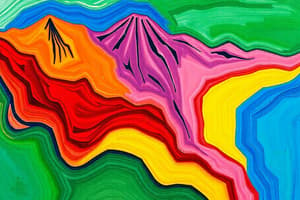Podcast
Questions and Answers
Which of the following is NOT a type of landform?
Which of the following is NOT a type of landform?
- Plateaus
- Mountains
- Coral Reefs (correct)
- Plains
Climate zones include only tropical and arid classifications.
Climate zones include only tropical and arid classifications.
False (B)
What is the process called that involves the breakdown of rocks and minerals?
What is the process called that involves the breakdown of rocks and minerals?
Weathering
The process by which water vapor becomes liquid water is known as ______.
The process by which water vapor becomes liquid water is known as ______.
Match the following soil types with their characteristics:
Match the following soil types with their characteristics:
Which factor does NOT influence climate?
Which factor does NOT influence climate?
Biogeography is concerned with the distribution of human populations.
Biogeography is concerned with the distribution of human populations.
Name one natural hazard that can significantly impact human settlements.
Name one natural hazard that can significantly impact human settlements.
GIS stands for ______.
GIS stands for ______.
What is one of the main tools used for mapping in physical geography?
What is one of the main tools used for mapping in physical geography?
Flashcards are hidden until you start studying
Study Notes
Physical Geography
-
Definition: Branch of geography dealing with the natural environment and how it influences human activity.
-
Key Components:
- Landforms:
- Types: Mountains, hills, plateaus, plains, valleys, deserts, and coasts.
- Processes: Erosion, weathering, tectonic activity, and sedimentation.
- Climate and Weather:
- Climate Zones: Tropical, arid, temperate, polar, and highlands.
- Factors Influencing Climate: Latitude, altitude, proximity to water, ocean currents, and prevailing winds.
- Soils:
- Types: Podzol, chernozem, laterite, desert soil, and alluvial soil.
- Importance: Fertility, agricultural productivity, and ecosystem support.
- Hydrology:
- Water Bodies: Rivers, lakes, glaciers, groundwater, and oceans.
- Water Cycle: Evaporation, condensation, precipitation, infiltration, and runoff.
- Biogeography:
- Distribution of ecosystems and biodiversity.
- Influence of climate and geography on flora and fauna.
- Landforms:
-
Natural Hazards:
- Types: Earthquakes, volcanoes, floods, hurricanes, and landslides.
- Impact on human settlements and infrastructure.
-
Human-Environment Interaction:
- How physical geography shapes human activities (e.g., agriculture, urban development).
- Environmental challenges: Climate change, deforestation, and desertification.
-
Tools and Methods:
- Geographic Information Systems (GIS) for mapping and analysis.
- Remote sensing technology for studying land use and environmental changes.
-
Current Trends:
- Sustainable development in relation to physical geography.
- The impact of climate change on physical landscapes and weather patterns.
Definition and Scope
- Physical geography examines the natural environment and its impacts on human activities, addressing both the earth's physical features and processes.
Key Components
-
Landforms:
- Varieties include mountains, hills, plateaus, plains, valleys, deserts, and coastal areas.
- Key processes include erosion, weathering, tectonic activity, and sedimentation that shape these landforms.
-
Climate and Weather:
- Defined by various climate zones: tropical, arid, temperate, polar, and highland.
- Influenced by factors such as latitude, altitude, proximity to water, ocean currents, and prevailing winds.
-
Soils:
- Types include podzol, chernozem, laterite, desert soil, and alluvial soil.
- Soil health is critical for fertility, agriculture, and supporting diverse ecosystems.
-
Hydrology:
- Covers water bodies like rivers, lakes, glaciers, groundwater, and oceans.
- The water cycle involves processes: evaporation, condensation, precipitation, infiltration, and runoff, crucial for maintaining freshwater availability.
-
Biogeography:
- Studies the distribution of ecosystems and biodiversity.
- Highlights how climate and geography determine the types of flora and fauna present in different regions.
-
Natural Hazards:
- Includes earthquakes, volcanoes, floods, hurricanes, and landslides.
- These hazards significantly impact human settlements and infrastructures, leading to economic and social consequences.
-
Human-Environment Interaction:
- Explores how physical geography influences human activities, such as agriculture and urban development.
- Addresses environmental challenges like climate change, deforestation, and desertification affecting sustainability.
Tools and Methods
- Geographic Information Systems (GIS) are utilized for precise mapping and analytical tasks.
- Remote sensing technology helps in monitoring land use and recognizing environmental changes over time.
Current Trends
- Focuses on sustainable development practices in harmony with physical geography to ensure resource availability for future generations.
- Identifies the effects of climate change on physical landscapes and evolving weather patterns, emphasizing the need for adaptation strategies.
Studying That Suits You
Use AI to generate personalized quizzes and flashcards to suit your learning preferences.




